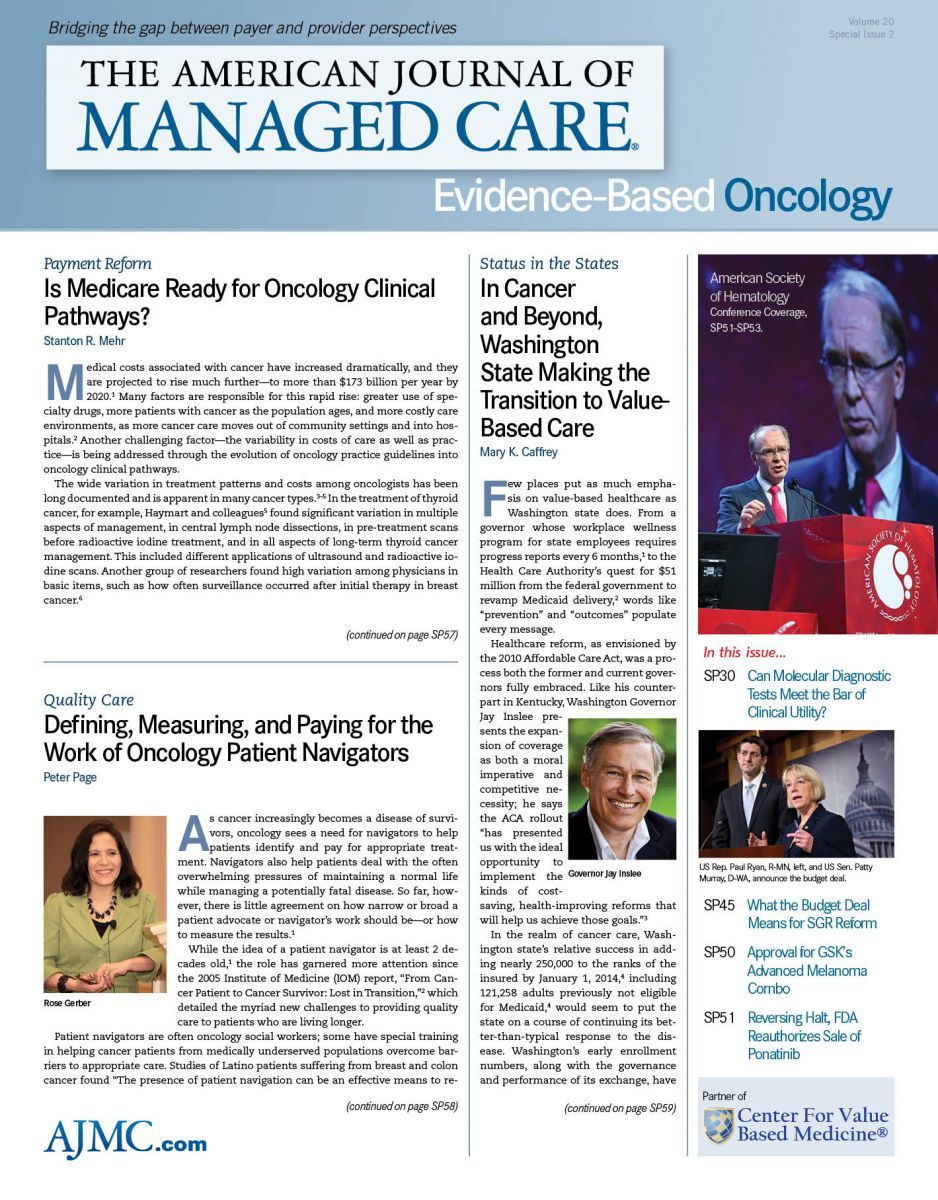- Center on Health Equity & Access
- Clinical
- Health Care Cost
- Health Care Delivery
- Insurance
- Policy
- Technology
- Value-Based Care
Adjuvant Pre- or Post-Operative Chemotherapy Does Not Improve Survival in Rectal Cancer
Researchers found improved local control but not improved overall survival in a long-term study that examined the addition of chemotherapy to pre-operative radiotherapy for patients with rectal cancer. The results from the European Organisation for the Research and Treatment of Cancer (EORTC) trial 22921 were published in the February 2014 issue of The Lancet Oncology.1
The study randomly assigned 1011 patients with clinical stage T3 or T4 resectable rectal cancer to receive preoperative radiotherapy, with or without concomitant chemotherapy, before surgery followed by either adjuvant chemotherapy or surveillance. Radiotherapy consisted of 45 Gy to the posterior pelvis in 25 fractions of 1·8 Gy over 5 weeks. Each course of chemotherapy consisted of fluorouracil (350 mg/m2 per day intravenous bolus) and folinic acid (leucovorin; 20 mg/m2 per day intravenous bolus). Two courses were administered (during weeks 1 and 5 of radiotherapy) for pre-operative chemotherapy, while adjuvant chemotherapy was given in 4 cycles, every 3 weeks. The primary end point was overall survival (OS).
Following a median follow-up of 10.4 years, 10-year OS was 49.4% for the preoperative radiotherapy group, 50.7% for the pre-operative radiotherapy and chemotherapy group, 51.8% for the adjuvant chemotherapy group, and 48.4% for the surveillance group. The 10-year disease-free survival was also quite similar between the groups: 44.2%, 46.4%, 47.0%, and 43.7%, respectively. However, incidence of local relapse at 10 years was highest with radiotherapy alone (22.4%), followed by radiotherapy and adjuvant chemotherapy (14.5%), neoadjuvant radiotherapy and chemotherapy (11.8%), and adjuvant and neoadjuvant chemotherapy (11.7%). The frequency of longterm side effects did not differ between the groups.
The authors concluded that adjuvant fluorouracil-based chemotherapy after preoperative radiotherapy (with or without chemotherapy) does not affect disease-free survival or OS and that new treatment strategies incorporating neoadjuvant chemotherapy are required.
Research in this field continues to explore the optimal duration of chemotherapy for patients with colorectal cancer (CRC), with the standard duration declining from 18 months to the
current standard of 12 cycles over 6 months, and a 3-month course is also being examined. According to Claus- Henning Kohne, MD, PhD, chairman of the Department of Hematology and
EBO
Oncology, Klinikum Oldenburg, Germany, “The most exciting research currently in stage III CRC is the examination of ever-shorter duration of treatment.” 2
References
1. Bosset JF, Calais G, Mineur L, et al. Fluorouracil- based adjuvant chemotherapy after preoperative chemoradiotherapy in rectal cancer: longterm results of the EORTC 22921 randomised study. The Lancet Oncology. 2014;15(2):184-190.
2. Managing Adjuvant Treatment in Colorectal Cancer, Part II. www.onclive.com. http://www.onclive.com/peer-exchange/colorectal-cancer/Managing-Adjuvant-Treatment-in-Colorectal-Cancer-Part-II. Accessed January 30, 2014.

Quality of Life: The Pending Outcome in Idiopathic Pulmonary Fibrosis
February 6th 2026Because evidence gaps in idiopathic pulmonary fibrosis research hinder demonstration of antifibrotic therapies’ impact on patient quality of life (QOL), integrating validated health-related QOL measures into trials is urgently needed.
Read More
Building Trust: Public Priorities for Health Care AI Labeling
January 27th 2026A Michigan-based deliberative study found strong public support for patient-informed artificial intelligence (AI) labeling in health care, emphasizing transparency, privacy, equity, and safety to build trust.
Read More
Ambient AI Tool Adoption in US Hospitals and Associated Factors
January 27th 2026Nearly two-thirds of hospitals using Epic have adopted ambient artificial intelligence (AI), with higher uptake among larger, not-for-profit hospitals and those with higher workload and stronger financial performance.
Read More
Motivating and Enabling Factors Supporting Targeted Improvements to Hospital-SNF Transitions
January 26th 2026Skilled nursing facilities (SNFs) with a high volume of referred patients with Alzheimer disease and related dementias may work harder to manage care transitions with less availability of resources that enable high-quality handoffs.
Read More
